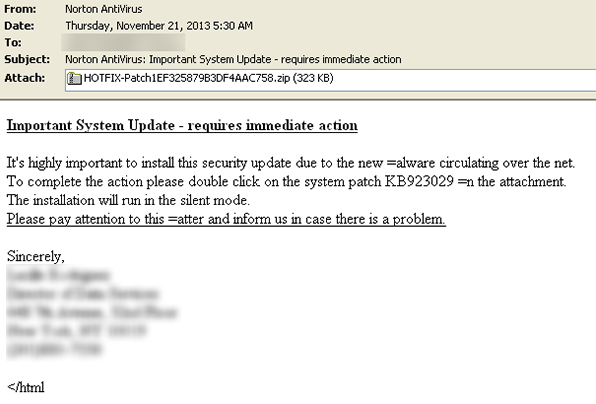Fake AV Software Updates Are Distributing Malware
A new clever way of social engineering spam is going around today that attempts to trick users into running malware on their computers. The methods malware authors are using include emails pretending to be from various antivirus software companies with an important system update required to be installed by the end user, along with attaching a fake hotfix patch file for their antivirus software. The email plays on end user concern over the lack of detection, especially in the face of the latest threats showcased in the media recently, such as the Cryptolocker Trojan. This type of social engineering entices users to open and install the hotfix without using much discretion as to what they may be actually installing.
Symantec has observed a number of different email subject lines that include many well-known antivirus software companies:
- AntiVir Desktop: Important System Update – requires immediate action
- Avast Antivirus: Important System Update – requires immediate action
- AVG Anti-Virus Free Edition: Important System Update – requires immediate action
- Avira Desktop: Important System Update – requires immediate action
- Baidu Antivirus: Important System Update – requires immediate action
- Cloud Antivirus Firewall: Important System Update – requires immediate action
- ESET NOD32 Antivirus: Important System Update – requires immediate action
- Kaspersky Anti-Virus: Important System Update – requires immediate action
- McAfee Personal Firewall: Important System Update – requires immediate action
- Norton AntiVirus: Important System Update – requires immediate action
- Norton Internet Security: Important System Update – requires immediate action
- Norton 360: Important System Update – requires immediate action
- Symantec Endpoint Protection: Important System Update – requires immediate action
- Trend Micro Titanium Internet Security: Important System Update – requires immediate action

